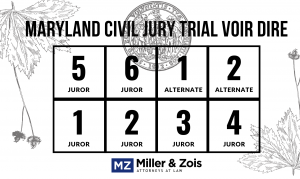Voir dire is the selection process in which prospective jurors are questioned and challenged to weed out jurors who may hear the case with an inordinate amount of prejudice and bias that lurks in the thinking of every Maryland juror. In most jurisdictions, the potential jurors are examined either by the prosecutor or, in a civil case, the plaintiff’s attorney for both cause and peremptory challenges.
 Unfortunately, in Maryland, voir dire is limited to questions proposed by counsel to be asked by the judge. There have been studies done in the voir dire context that show questioning from a judge inhibits juror candor. What then do Maryland lawyers rely upon in picking a jury? Gut instincts and stereotyping.
Unfortunately, in Maryland, voir dire is limited to questions proposed by counsel to be asked by the judge. There have been studies done in the voir dire context that show questioning from a judge inhibits juror candor. What then do Maryland lawyers rely upon in picking a jury? Gut instincts and stereotyping.
Before every trial, I read anything I can get my hands on to get a better idea of what I am looking for in potential jurors who will be receptive to my client. One very early morning, around 1:00 a.m., before a huge trial, I went to my good friend Google and did a search. I found a law review article from Ohio Northern University (have you ever heard of it?) from 1990 that summarized the literature on stereotypes in juror selection.
What Jurors Do You Want?
I disagree with at least a full third of the article, but it is fascinating. Here are some conclusions of the studies/article summarized: Continue reading
 Maryland Injury Law Center
Maryland Injury Law Center


